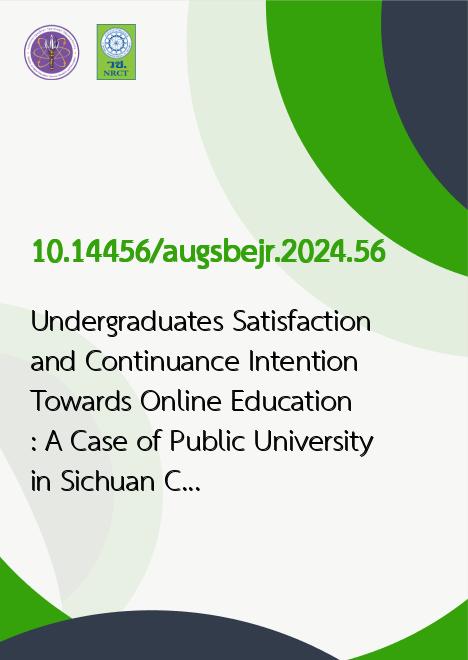
|
Undergraduates Satisfaction and Continuance Intention Towards Online Education: A Case of Public University in Sichuan China |
|---|---|
| รหัสดีโอไอ | |
| Creator | Yuli Zeng |
| Title | Undergraduates Satisfaction and Continuance Intention Towards Online Education: A Case of Public University in Sichuan China |
| Publisher | Assumption University Press |
| Publication Year | 2567 |
| Journal Title | AU-GSB e-Journal |
| Journal Vol. | 17 |
| Journal No. | 3 |
| Page no. | 133-142 |
| Keyword | Online Education, Perceived Ease of Use, Perceived Usefulness, Satisfaction, Continuance Intention |
| URL Website | http://www.assumptionjournal.au.edu/index.php/AU-GSB/article/view/7689 |
| Website title | AU-GSB e-Journal |
| ISSN | 1906-3296 |
| Abstract | Purpose: This study analyzes the satisfaction and continuance intention to use online education among undergraduates, who are pursuing a degree in accounting, translation, Chinese language and literature, and ideological and political education in Chengdu, China. The conceptual framework consists perceived ease of use, perceived usefulness, system quality, service quality, information quality, satisfaction, and continuance intention. Research design, data, and methodology: The study was carried out via a quantitative survey technique to collect the data among 500 undergraduates. Item-objective congruence is used to assess the research instrument's validity, and a pilot study was undertaken to evaluate the internal consistency reliability utilizing the Cronbach alpha coefficient. Furthermore, the sampling approach comprises judgmental, quota and convenience sampling. The data analysis encompassed assessing model fit, reliability, and validity through the utilization of Confirmatory Factor Analysis (CFA) and Structural Equation Models (SEM). Results: All hypotheses are supported in this study. Perceived ease of use, perceived usefulness, system quality, service quality, and information quality significantly impact satisfaction. Perceived ease of use has a significant impact on perceived usefulness. Furthermore, satisfaction has a significant impact on continuance intention. Conclusions: This research further demonstrated that learners' satisfaction improves if online educational settings present a range of methods for evaluating their progress and if they connect with others. |